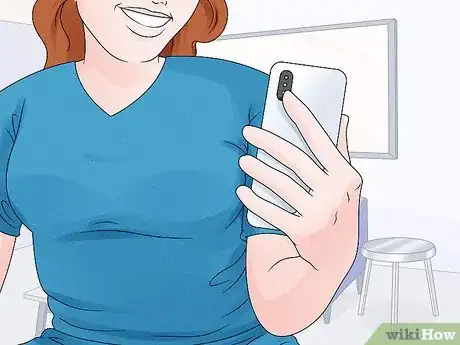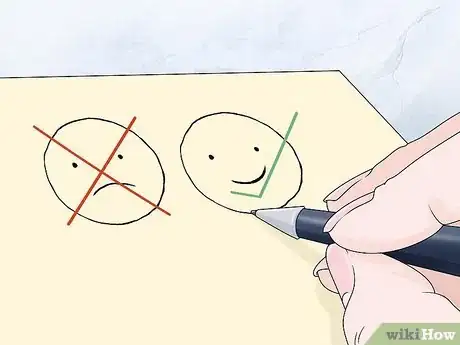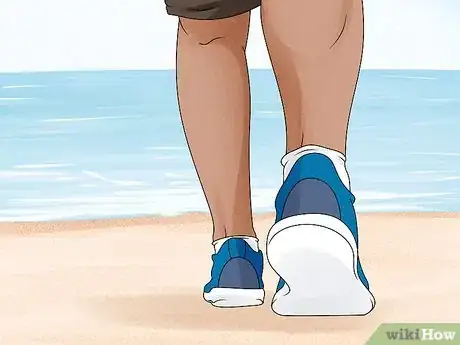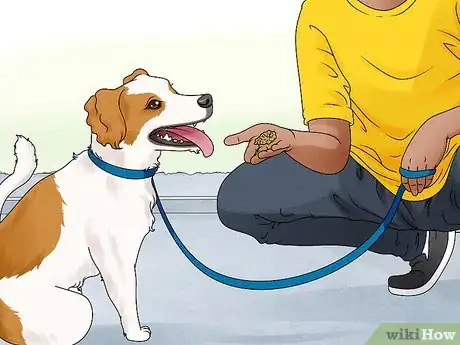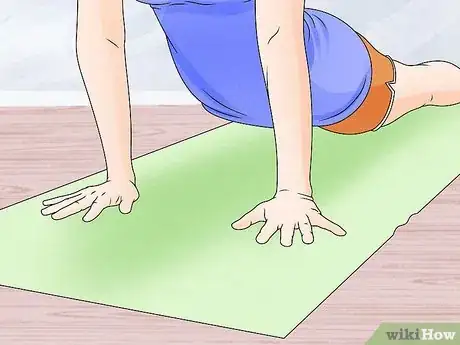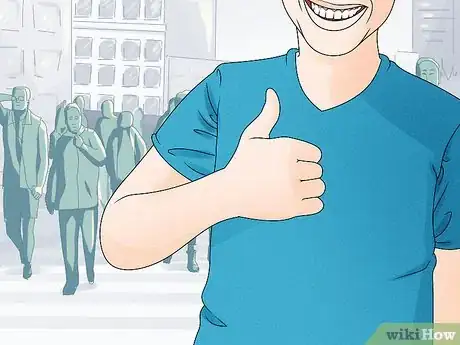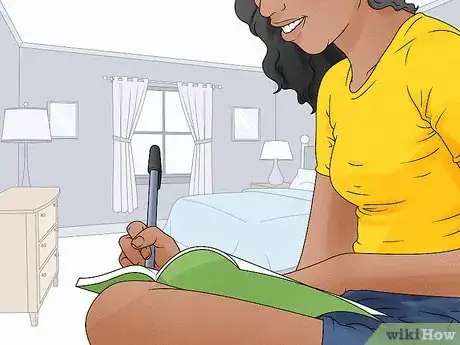This article was co-authored by Leah Morris and by wikiHow staff writer, Amber Crain. Leah Morris is a Life and Relationship Transition coach and the owner of Life Remade, a holistic personal coaching service. With over three years as a professional coach, she specializes in guiding people as they move through both short-term and long-term life transitions. Leah holds a BA in Organizational Communication from California State University, Chico and is a certified Transformational Life Coach through the Southwest Institute for Healing Arts.
There are 9 references cited in this article, which can be found at the bottom of the page.
wikiHow marks an article as reader-approved once it receives enough positive feedback. In this case, 83% of readers who voted found the article helpful, earning it our reader-approved status.
This article has been viewed 276,892 times.
We all have trouble being alone from time to time. Whether we're single, living alone, or simply having a tough time tolerating being by ourselves, it can be a challenge to feel happy if you're lonely. In this article, we'll walk you through a variety of useful strategies for staying positive and living your best life when you're on your own.
Here are 14 tips and tricks to help you feel happy even when you’re alone.
Steps
Learn something new.
-
Exploring new hobbies keeps your mind active and engaged. It’s normal to feel a bit empty and restless when you’re lonely. Throwing yourself into interesting new hobbies can help with that! Use your alone time to explore something you've always wanted to do. Consider activities like:[1] X Trustworthy Source Harvard Business Review Online and print journal covering topics related to business management practices Go to source
- Learning a new language
- Gardening
- Learning to play an instrument
- Arts and crafts projects
Create and follow a daily routine.
-
A set schedule can give you a sense of order and purpose. Being alone has a way of making people feel a bit lost. Taking a few minutes to create a daily schedule for yourself can help prevent that feeling! Schedule in regular daily activities, like work, exercise, or cooking, as well as hobbies and other pursuits.[2] X Research source
- Schedule in communication, too, especially if you’re introverted and struggle with that. For example, pencil in a time to call or video chat with a friend.
Make a list of things you're grateful for.
-
It’s easy to focus on the negative when you’re by yourself. Everyone does this from time to time, but that doesn’t mean it’s healthy. When you feel yourself getting stuck in that negative headspace, make an effort to get yourself out by focusing on the positive things in your life. Grab a pen and some paper and write down an actual list![3] X Research source
- You can also try making these lists more often, like at the end the day or week.
Limit your time on social media.
-
Use social media to connect but log out if it feels negative. Social media is a great way to meet and interact with others, but it has downsides, too. If you notice that you’re using it to compare yourself to others, or if you feel bad about yourself or even lonelier after using social media, it might help to log out more often.[4] X Trustworthy Source Harvard Business Review Online and print journal covering topics related to business management practices Go to source
- When you're online, focus on meaningful conversations and positive interactions. Try to spend less time mindlessly scrolling.
Go for a walk.
-
A change of scenery can boost your mood and shift your perspective. If you’re feeling lonely, try to force yourself to get up and go for a brief walk. Just a few minutes outdoors can help you get your mind off things and refresh you.[5] X Research source
- If negative thoughts start creeping in, gently remind yourself to refocus on your surroundings.
Volunteer in your community.
-
Giving your time and effort to help others eases loneliness. Everyone likes to feel needed; doing volunteer work is a selfless way for you to fulfill that need while also making a difference in your community. When you’re actively engaged and helping others, it’s hard to feel truly alone.[6] X Research source Look into volunteer opportunities like:
- Serving food at a soup kitchen
- Mentoring a young person in a Big Brother or Big Sister program
- Reading to the elderly in nursing homes
- Environmental or animal rights activism
Explore your feelings in a journal.
-
Writing down thoughts and feelings can help you make sense of them. Regular journaling can help you get to know yourself better through self-expression. You can also practice gratitude by keeping track of what you're grateful for in your journal. Take a few minutes each day make note of a few things.[7] X Trustworthy Source Greater Good Magazine Journal published by UC Berkeley's Greater Good Science Center, which uses scientific research to promote happier living Go to sourceEXPERT TIPDr. Adam Dorsay is a licensed psychologist in private practice in San Jose, CA, and the co-creator of Project Reciprocity, an international program at Facebook's Headquarters, and a consultant with Digital Ocean’s Safety Team. He specializes in assisting high-achieving adults with relationship issues, stress reduction, anxiety, and attaining more happiness in their lives. In 2016 he gave a well-watched TEDx talk about men and emotions. Dr. Dorsay has a M.A. in Counseling from Santa Clara University and received his doctorate in Clinical Psychology in 2008.Licensed Psychologist & TEDx Speaker

 Adam Dorsay, PsyD
Adam Dorsay, PsyD
Licensed Psychologist & TEDx SpeakerPracticing gratitude can help you become happier, less depressed, and less anxious.
Focus on your positive qualities.
-
Make a list of things that you truly like about yourself. There’s nothing wrong with appreciating yourself! Take some time to celebrate your good qualities. Reflect on your best traits. You can even add these to your gratitude lists or journal.[8] X Expert Source

Life Coach Expert Interview. 19 June 2020.- For example: "I do an awesome job at work. I'm a valued member of the team."
- Or look at yourself in the mirror and say, "I have kind eyes."
- If you're having trouble with this, ask a few trusted friends or family members what they think your best qualities are.
Exercise more often.
-
Studies show regular exercise eases loneliness and boosts mood. We all know exercise makes us physically fit, but did you know it also releases chemicals in your brain that make you feel positive and happy? It’s true! If you feel uncomfortable exercising around other people, start with easy activities you can do by yourself, like running, walking, or biking.[9] X Research source
- If you don’t mind exercising with others, that may offer even more mood-boosting benefits! Consider trying fitness or yoga classes, or working out in a public gym.
Treat yourself like you’d treat a friend.
-
Speak to yourself with kindness and compassion—you deserve that. Positive self-talk takes practice, but it's worth it. For example, if you find yourself thinking negative thoughts such as, "Nobody wants to spend time with me," change this thought to something more realistic like, "People love spending time with me, but sometimes they get busy and that's normal."[10] X Expert Source

Life Coach Expert Interview. 19 June 2020.- If you feel like you aren’t doing a good job at work or school, tell yourself something a friend might say like, “Are you serious? You're great at your job!"
- If you’re an introvert, keep in mind that that isn’t a flaw! It’s a completely natural and acceptable way to be.
Remind yourself that it's okay to be alone.
-
Remember that being alone and being lonely are different things! It might not seem like it now, but you can be alone without feeling lonely. Spend some time thinking of reasons why being alone can be a positive thing. You can even make a list and keep it with you![11] X Research source Here are a few examples to get you started:
- The freedom to daydream and be introspective
- The ability to do things your way without compromising
- More time to focus on your health and well-being
- More time to practice and develop your skills
Explore mindfulness techniques.
-
Meditation and breathing exercises can help you feel calm and centered. Mindfulness is about being in the here-and-now, or living in the present moment, appreciating it without dwelling too much in the past or worrying about the future. Studies show that mindfulness techniques can help to reduce feelings of loneliness and anxiety.[12] X Trustworthy Source PubMed Central Journal archive from the U.S. National Institutes of Health Go to source Consider exploring:
Focus on quality connections over quantity.
-
Spend quality time with the people who are important to you. Focus on connecting and conversing with them instead of doing passive activities like watching television. If you feel secure about the connections in your life, you’re less likely to feel lonely when you’re at home or doing things by yourself.[13] X Trustworthy Source Harvard Business Review Online and print journal covering topics related to business management practices Go to source
- If it’s been a while, reach out and see how they’re doing! Make plans to catch up soon.
- When you’re alone, focus on the positive memories you have with the people you love.
Seek professional help if you’re struggling.
-
Therapy can help you feel heard and understood. Loneliness can be a symptom of a larger issue like depression. If you find yourself becoming increasing lonely or not being able to tolerate being alone, it may benefit you to seek professional help.[14] X Research source
- Psychotherapy can be a useful way to understand yourself better.
- Contact your medical insurance provider for a list of approved psychologists, therapists, and psychiatrists.
- Avoid drinking alcohol or using other substances to cope with being alone.
- Be patient - good things will come.
You Might Also Like

 11 Ways to Trigger the Hero Instinct
11 Ways to Trigger the Hero Instinct



 13 Ways to Not Catch Feelings
13 Ways to Not Catch Feelings

 Here’s Why You Can’t Remember Your Childhood or Teenage Years
Here’s Why You Can’t Remember Your Childhood or Teenage Years

 Should You Talk to Your Crush After Being Rejected?
Should You Talk to Your Crush After Being Rejected?




References
- ↑ https://hbr.org/2020/04/how-to-be-alone-without-being-lonely
- ↑ https://u.osu.edu/emotionalfitness/tag/coping-with-loneliness/
- ↑ https://psychiatry.uchicago.edu/news/17-easy-things-do-when-youre-feeling-lonely
- ↑ https://hbr.org/2020/04/how-to-be-alone-without-being-lonely
- ↑ https://psychiatry.uchicago.edu/news/17-easy-things-do-when-youre-feeling-lonely
- ↑ https://psychiatry.uchicago.edu/news/17-easy-things-do-when-youre-feeling-lonely
- ↑ http://greatergood.berkeley.edu/article/item/tips_for_keeping_a_gratitude_journal
- ↑ Leah Morris. Life Coach. Expert Interview. 19 June 2020.
- ↑ https://www.washingtonpost.com/lifestyle/2020/01/21/heres-how-exercise-reduces-anxiety-makes-you-feel-more-connected/
- ↑ Leah Morris. Life Coach. Expert Interview. 19 June 2020.
- ↑ https://caringmagazine.org/alone-vs-lonely-how-to-be-alone-without-being-lonely/
- ↑ http://www.ncbi.nlm.nih.gov/pmc/articles/PMC3635809/
- ↑ https://hbr.org/2020/04/how-to-be-alone-without-being-lonely
- ↑ https://www.local.gov.uk/sites/default/files/documents/combating-loneliness-guid-24e_march_2018.pdf
About This Article

To be happy even when you're alone, work on fun activities that you can do by yourself, like learning to play an instrument or paint landscapes. You can also engage in simple tasks, like going for walks or shopping by yourself, to slowly get used to enjoying things by yourself. Additionally, try solo exercises, like running, hiking, or biking, to boost your endorphins, which will make you feel more positive in general. If you start feeling down about yourself, remind yourself of the perks of being alone, like doing what you want without someone else's approval. To learn how to give yourself praise for a job well done, keep reading!

